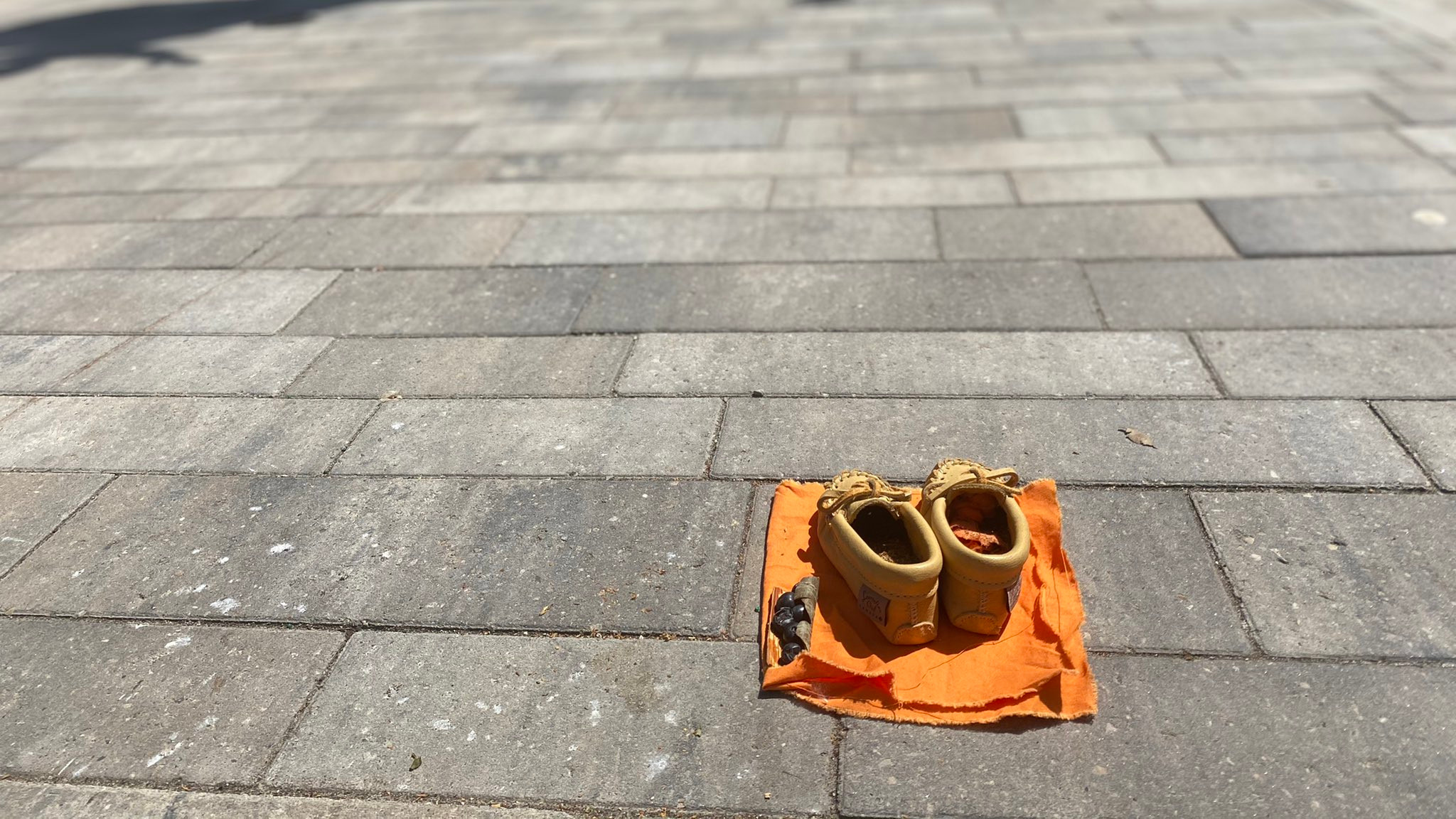The archbishop of Toronto expressed “great sorrow” Sunday for the abuse that took place at Canada’s residential schools, though he insisted the prime minister was “unfair” in his calls for the Catholic Church to take more responsibility.
Cardinal Thomas Collins also said it was “very important” when Pope Francis held a moment of silent prayer Sunday in honour of Canadian Indigenous children who died at residential schools and the families who mourn them, despite the pontiff not offering an apology for the Church’s participation in the schools.
Collins expressed sadness for the rampant suffering endured at the institutions, both in an interview with The Canadian Press and in remarks delivered at a service in Toronto.
He said the Church as a whole has also owned up to its role in the system and chastised Prime Minister Justin Trudeau for seeking further action.
“I would think that Mr. Trudeau and his government … should join with us and with the Indigenous people in our journey together,” Collins said in a telephone interview. “We want to work together. These types of sharp comments, which are not based on real fact, are most unfortunate.”
As the Pope addressed his congregation Sunday in the heart of Vatican City, Collins was inviting his own assembly from Toronto’s St. Michael’s Cathedral Basilica to bow their heads and honour those who died in Canadian residential schools.
The system targeted Indigenous children for decades, and some 150,000 First Nations, Metis and Inuit children were forcibly sent to the institutions where many suffered abuse and even death.
The issue was propelled back into the national spotlight 10 days ago when the Tk’emlups te Secwepemc First Nation in British Columbia announced that the remains of 215 Indigenous children are believed to be buried at an unmarked site at the former Kamloops Indian Residential School. Ground-penetrating radar confirmed the findings, the First Nation said.
Pope Francis said he is following news of the findings “with pain” after leading the Angelus prayer on Sunday. “I join the Canadian bishops and the entire Catholic Church in Canada in expressing my closeness to the Canadian people traumatized by the shocking news,” he said.
He did not mention Trudeau’s call for him to apologize for the Catholic Church’s role in Canadian residential schools, which came at a Friday news conference. Saskatchewan’s Federation of Sovereign Indigenous Nations is also demanding an apology from the Pope, saying it is the right thing to do.
“This was genocide, and it should be acknowledged as such by the perpetrators, the Church, the Government, and the RCMP,” the organization representing 74 of the province’s First Nations said in a release Sunday.
In response to Trudeau, Collins pointed out that Pope Benedict XVI apologized in 2009 to a delegation from Canada’s Assembly of First Nations for the abuse experienced by children in residential schools. Benedict called the children’s treatment “deplorable” in the same address.
Collins also noted the Oblates of Mary Immaculate, who ran the Kamloops residential school, apologized in 1991.
Trudeau also said Friday he was “deeply disappointed” with the Church’s position on releasing residential school records.
“We’re still seeing resistance from the Church, possibly from the Church in Canada,” he said.
Collins called those remarks “unhelpful,” noting that as far as he understands, the Oblates are releasing whatever documentation they have.
“But I totally agree that everything should be made known,” he said, adding that any information that may be withheld should be released. “This whole residential school system was a terrible thing … we have to repent of that and be deeply careful to ensure it never happens again.”
Lawyer Mary Ellen Turpel-Lafond said she appreciates what seems to be a “heartfelt commitment” from the Cardinal to provide unmitigated access to records that would help family members identify residential school victims, especially those from the school in Kamloops.
But those in power have “taken positions contrary to the words expressed today,” Turpel-Lafond, the director of the Indian Residential School History and Dialogue Centre at the University of British Columbia, said in an email Sunday.
She, too, called on “the highest authority in the Church” to apologize and direct that all records and archival material be released without exceptions.
“Leaving First Nations in limbo to engage with the dozens of church congregations, past and present, does not reflect a fulsome human rights approach,” she said. “Canada needs to do better.”
This report by The Canadian Press was first published June 6, 2021.
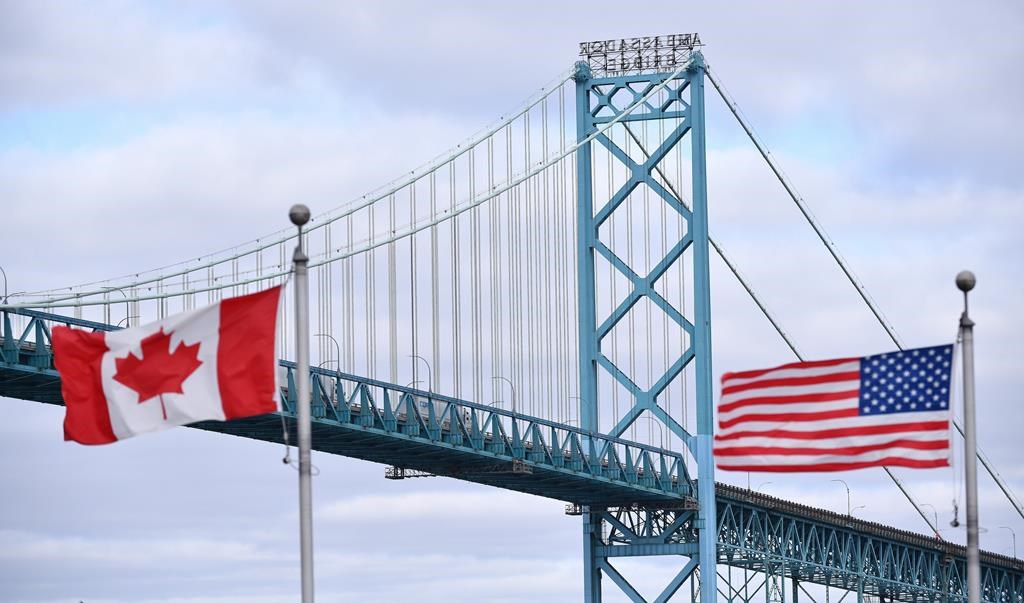
The federal government has approved a plan that would see NHL teams cross the Canada-U.S. border for the final two rounds of the Stanley Cup playoffs without having to quarantine.
Team members will travel, both in and out of the country, using private planes and will be tested for COVID-19 pre- and-post arrival in addition to daily testing.
Throughout playoff rounds that require cross-border travel, players will live in a modified quarantine bubble that includes the team hotel and the arena when in Canada.
The measures mandate that there will be no sharing of facilities between players and the general public, and players must severely limit their time interacted with the public in both Canada and the United States.
A two-week isolation period is currently required for all non-essential travellers entering the country due to the COVID-19 pandemic.
Earlier this year, NHL players and personnel were granted a special dispensation before this year’s NHL trade deadline in April that required only a seven-day quarantine.
“The National Hockey League is very appreciative of the decision by the Canadian government and the Federal health officials to allow the Canadian team that advances to the Stanley Cup Semi-Finals and, potentially, the Final, to host games in their own rinks,” read a statement released by deputy NHL commissioner Bill Daly.
Currently the Winnipeg Jets and Montreal Canadiens are playing in the North Division final with the winner moving on to the Stanley Cup semifinal against one of three American-based teams.
In a best-of-seven series, one team traditionally hosts Games 1, 2, 5 and 7 and the other hosts Games 3, 4 and 6.
The NHL had said it was considering having the Canadian division winner relocate to the U.S. for the final two rounds if it could not secure approval from government.
Other Canadian professional sports teams have had to relocate to the U.S. to avoid cross-border travel.
Major League Baseball’s Toronto Blue Jays started their season playing home games in Dunedin, Fla., and began calling Buffalo home this week.
Major League Soccer’s Toronto FC, CF Montreal and Vancouver Whitecaps have relocated to Orlando, Fort Lauderdale, Fla., and Sandy, Utah, respectively.
Major League Rugby’s Toronto Arrows are now based in Marietta, Ga., while the NBA’s Toronto Raptors recently completed their season in Tampa.
Canadian pro teams in many leagues outside the NHL have a larger majority, if not a full complement, of rivals in the U.S., making cross-border travel a requirement if they are to play in Canada.
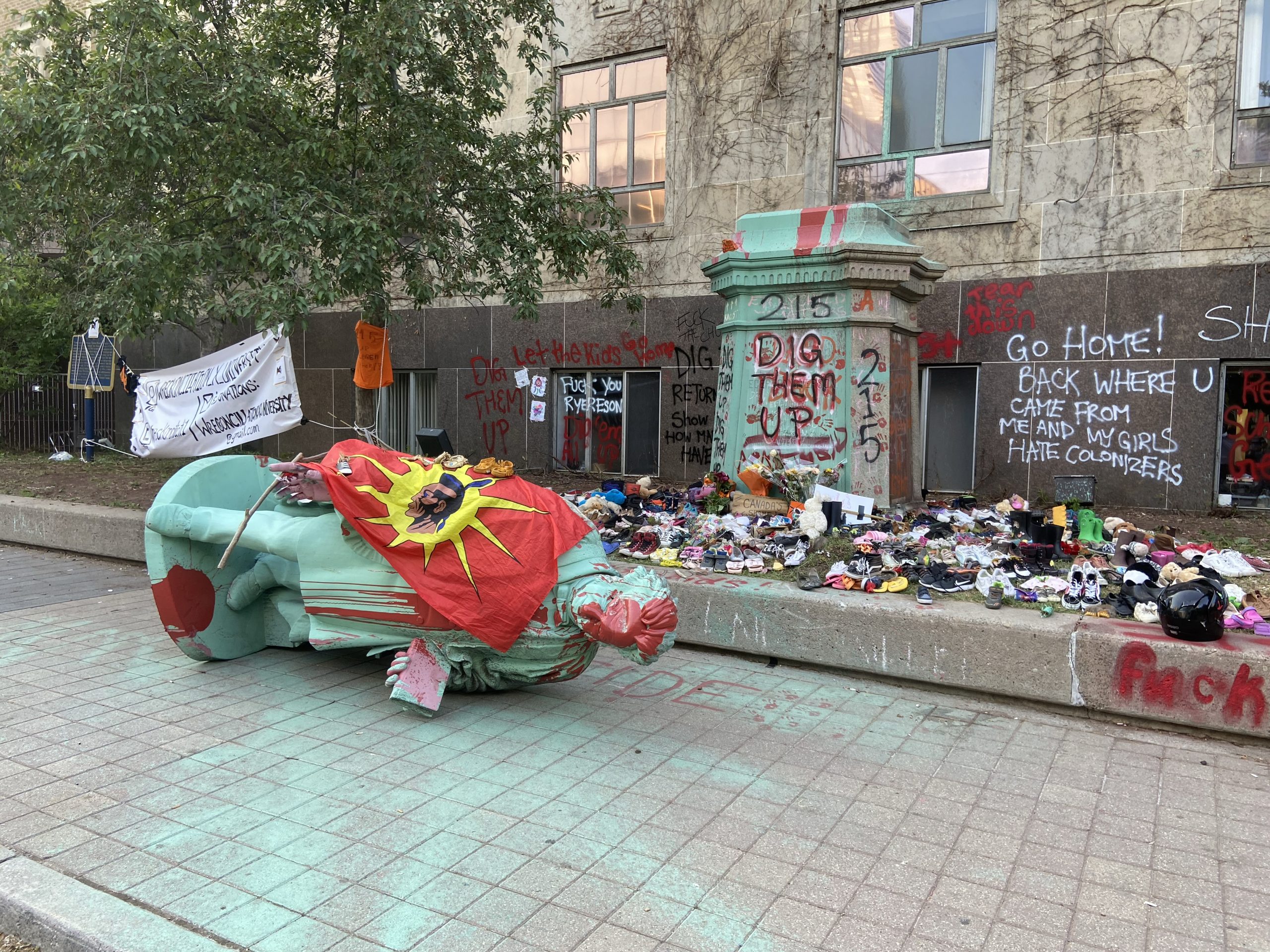
The statue of Egerton Ryerson on the campus of Toronto’s Ryerson University was brought down on Sunday.
It’s not known who toppled the statue or the exact time when the incident occurred.
A social media video from the scene showed the statue being pulled down off its pedestal with a rope, while a small crowd cheered nearby.
Later in the evening, another video posted to Twitter appeared to show a group of people attempting to cut the head off the statue.
Toronto police said they are aware of the incident, and said they believe the statue was knocked down after a protest downtown.
The statue had been vandalized earlier this week, and had been covered in red paint and graffiti that reads “show the world how many of us you have murdered”, “dig them up” and “land back.”
A focus of fierce debate in recent years, activist groups, students and faculty had been asking for the monument to be removed.
Egerton Ryerson was one of the architects of Canada’s residential school system, which sought to convert and assimilate Indigenous children into Canadian culture and saw them suffer widespread physical and sexual abuse. He died in 1882.
The discovery in Kamloops, B.C., of what are believed to be the remains of 215 Indigenous children at a former residential school has intensified the discussion of the role these schools have played in Canada’s long colonial history.
Ryerson University has addressed the statue issue in the past. In 2010, the university published a statement saying that while Ryerson did not implement or oversee residential schools, his beliefs “influenced, in part, the establishment of what became the Indian Residential School system.”
Eight years later, the school added a sign beside the statue that read, in part: “As Chief Superintendent of Education, Ryerson’s recommendations were instrumental in the design and implementation of the Indian Residential School System.”
More recently, there have even been calls to rename Ryerson University, with the school’s journalism department saying on June 2 it would rename two of its publications ahead of the new school year, dropping any reference to the man the school is named after.
Files from Dilshad Burman, Lucas Casaletto and the Canadian Press were used in this report
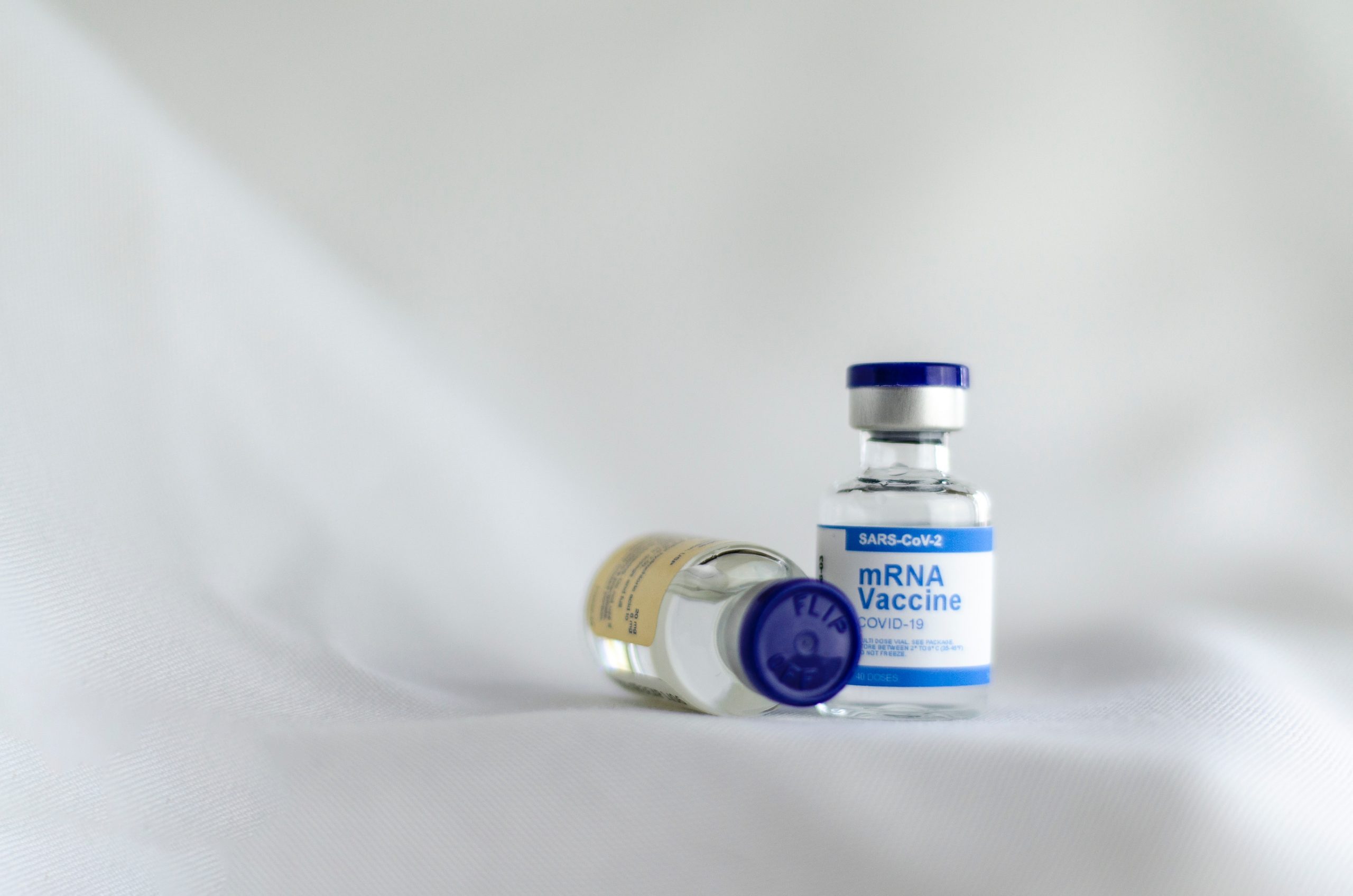
Ontario has updated its guidance on second doses for people who received a first dose of the AstraZeneca vaccine to allow for mixing vaccines.
Beginning Friday, anyone who received their first shot of AstraZeneca will be able to choose between a second dose of the same vaccine or an mRNA shot.
Both second dose options will be available at the recommended 12-week interval so only those who got the first shot 12 weeks ago will be eligible initially.
Individuals who want the second dose of AstraZeneca can contact the pharmacy or primary care provider where they received their first to book an appointment. If they would like to receive an mRNA vaccine as a second dose they can make an appointment at a pharmacy where Pfizer or Moderna are being offered.
The province says some pharmacies or primary care setting could also be reaching out to eligible residents.
Starting next week, a ‘second dose only’ option will become available through the online provincial booking system for those who want Pfizer or Moderna for the second shot. Eligible residents will also be to book through public health units that use their own booking system.
“Nothing is more important than the health of Ontarians, and for the best protection against COVID-19 it is vital that everyone who received the AstraZeneca vaccine for their first dose receives a second dose of a COVID-19 vaccine,” said Dr. David Williams, Chief Medical Officer of Health.
“We are providing individuals who have received only their first dose of the AstraZeneca vaccine with two recommended options based on the available data and evidence and will continue to work with Health Canada to monitor the quality and efficacy of all COVID-19 vaccines being used in Ontario.”
The updated guidance from the province is aligned with the latest recommendation from the National Advisory Committee on Immunization (NACI).
NACI updated its guidance to recommend that the second shot of an mRNA vaccine, Moderna or Pfizer, can be the follow-up to the first dose of AstraZeneca.
NACI also says individuals that received the first dose of Pfizer or Moderna should be offered the same mRNA shot. If supply does not allow for that, the health committee says those who received the first shot of Pfizer could, then, get a second dose of Moderna or vice versa.
Ontario announced last week it was moving forward with accelerating second COVID-19 vaccine doses with possible intervals as short as four weeks.
The accelerated second dose plan aims to have the majority of Ontario residents who choose to get the vaccine be fully vaccinated by the end of summer.
The province hit another vaccine milestone on Tuesday as pharmacies celebrated over one million doses administered.
The CEO of the Ontario Pharmacists Association tweeted out the figure and thanked all pharmacy professionals involved in getting shots into arms.
Select pharmacies in the province have been administering AstraZeneca, Moderna, and Pfizer.
Justin Bates says with continued shipments of Moderna and Pfizer, they’re hoping to increase the amounts for pharmacies with high demand.
He also says they’re expecting a new batch of AstraZeneca to arrive for second doses at those original pharmacies that were part of a pilot project.
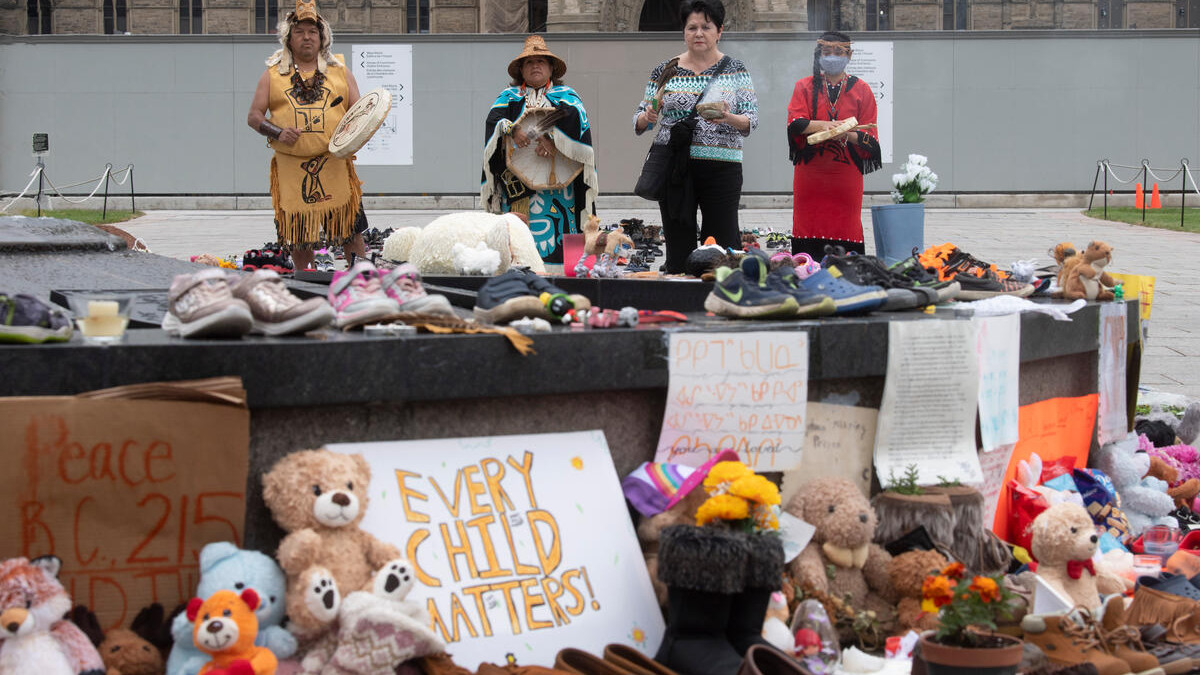
A bill creating a statutory holiday to commemorate the tragic legacy of residential schools in Canada received royal assent Thursday after passing unanimously in the Senate.
The swift passage of Bill C-5 means Sept. 30 will become the first of what is to be an annual national day for truth and reconciliation.
Both houses of Parliament were prompted to fast-track the bill after last week’s grisly discovery of what are believed to be the remains of 215 Indigenous children in unmarked graves at a former residential school in Kamloops, B.C.
The bill creates a statutory holiday for employees in the federal government and federally regulated workplaces.
Canadian Heritage Minister Steven Guilbeault told the Senate on Thursday that the objective is to create a chance for Canadians to learn about and reflect on a dark chapter in their country’s history and to commemorate the survivors, their families and their communities — as called for by the Truth and Reconciliation Commission and Indigenous leaders.
The “terrible” discovery of children’s remains in Kamloops is “a stark reminder of the heavy toll of our colonial past,” Guilbeault said in French.
“Addressing the consequences of colonial violence needs to go beyond words … Bill C-5 is an important step in the path towards reconciliation, which won’t be achieved in the blink of an eye.”
Over the course of more than 100 years, some 150,000 Indigenous children were ripped from their families and forced to attend church-run residential schools, where many suffered physical and sexual abuse, malnutrition and neglect. More than 4,000 are believed to have died.
Although unanimously supported in the Senate, Guilbeault did face some questions about the cost of creating a new national holiday and whether it is simply an empty symbolic gesture.
Conservative Senate leader Don Plett noted that the government has been slow to implement the 94 calls to action from the Truth and Reconciliation Commission, including those dealing with locating and commemorating grave sites at residential schools.
“Why, minister, did you choose to focus on this call of action (to create a national day for truth and reconciliation) and not on other ones?” Plett asked.
“Minister, is it because it’s easier to give bureaucrats (a holiday), because really it’s bureaucrats that get the day off here, than to work on the more pressing but difficult issues that are facing Indigenous communities every day of the week?”
Plett further questioned how the government can ensure it is day of commemoration and not simply a “day to stay home and put up our feet and watch TV.”
Guilbeault acknowledged that the government can’t force people to use the day to reflect on the trauma caused by residential schools. But he expressed hope that it will be similar to Remembrance Day, creating an opportunity to educate and remind Canadians about the history of residential schools, honour the victims and celebrate the survivors.
“Let’s use that day as a day of reflection but also a day of learning,” he said.
Guilbeault could not offer any details of federal plans to mark the first truth and reconciliation day on Sept. 30. Commemorations should be Indigenous-led, he said.
Officials estimated that the day off will cost the federal government almost $166 million each year, mainly in lost productivity, and another $223 million for federally regulated employers.
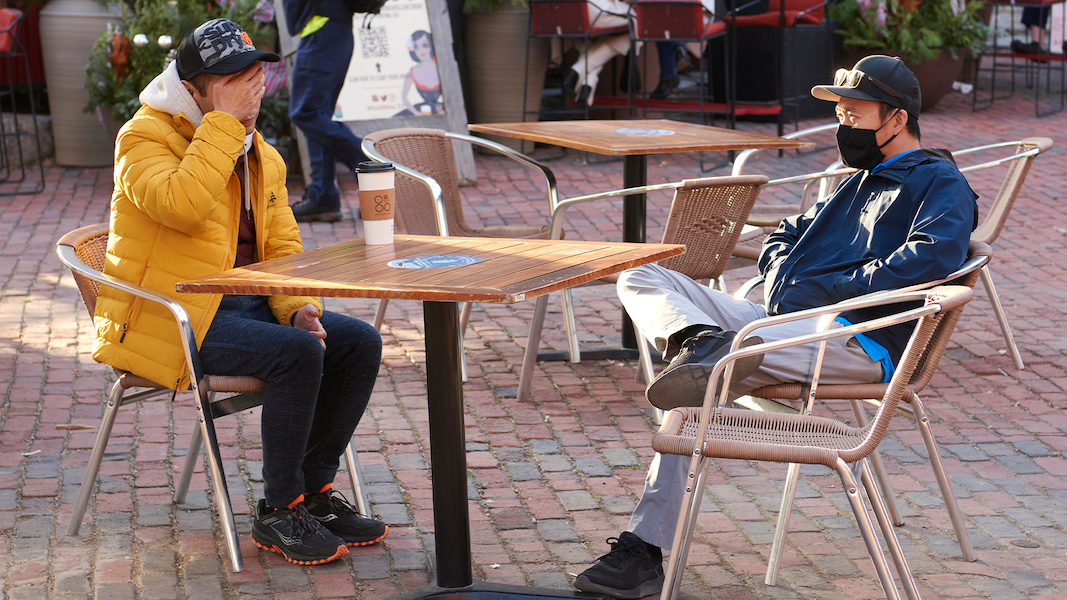
Are patios coming sooner than expected? It remains unclear, but Premier Doug Ford’s office says the province will not be entering Step 1 of their reopening plan this weekend.
Ontario’s health hinister did provide a little more insight into the government’s plans when it comes to their reopening tentatively slated for June 14.
“I don’t have a specific date. I don’t think it would be a week earlier but it may be a few days earlier that we may be able to proceed,” Christine Elliott said.
The Premier’s office tells 680 NEWS that “plenty of notice” would be given to businesses so they will be ready to reopen.
Step 1 of the province’s roadmap to reopening requires 60 percent of adults be vaccinated with one dose with hospitalizations, ICU occupancy and new admissions down.
Outdoor settings would expand to 10 people with up to four people able to dine together at a patio per table. Essential retail would be capped at 25 per cent capacity and non-essential retail – such as malls – would resume at 15 per cent capacity.
On the subject of reopening ahead of time, Ontario’s Chief Medical Officer of Health Dr. David Williams said the “data is less promising at this time,” pointing to a concerning rise in cases over the last few days.
On Wednesday, Ford said admitted he is cautiously optimistic the province could reopen just ahead of schedule but denied putting the economy first and ahead of students and teachers.
“I’m so hopeful that as things are going, we may be able to enter Step 1 safely earlier than June 14,” Ford said.
He then backtracked saying that the province would “stick to the plan” in light of the growing delta (B.1.617) variant being reported in Ontario.
Some critics accused the premier of prioritizing the economy over schools – the opposite of the approach championed by the province’s top doctor, who has said repeatedly that he believes schools should be the last to close and the first to open during the pandemic.
“Today [Wednesday], Doug Ford chose patios over schools. Patios over people,” Liberal house leader John Fraser said.
The first dose vaccination rate for eligible residents in Ontario is currently at 66 per cent, beyond where the province said they needed to be for Step 1 of the reopening plan to begin.
Ford says it’s not just vaccination rates that the government is looking at to determine the reopening timeline.
“We’re going to be opening up but we’re going to be opening up cautiously and carefully, very cautiously and very carefully because I do not want to happen what happened before and all of a sudden the cases go up.”
Ontario is reporting 870 new cases of COVID-19 today and 10 more deaths linked to the virus.
Health Minister Elliott says there are 225 new cases in Toronto, 167 in Peel Region and 49 in the Porcupine Health Unit region.
With files from 680 NEWS business editor Richard Southern
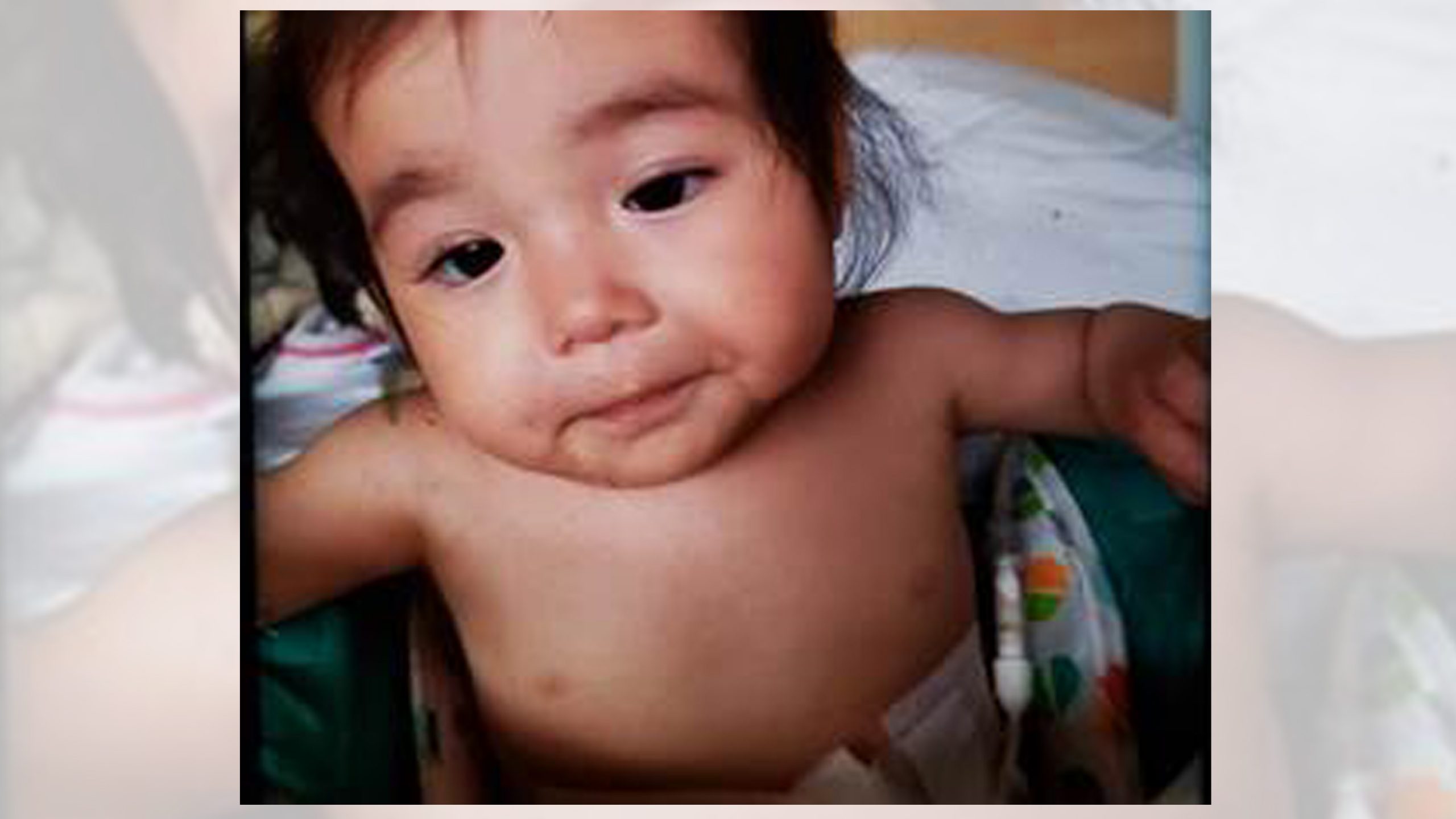
An Amber Alert has been issued for an 11-month-old Ottawa infant.
The Ottawa Police Service issued the alert shortly before 4 a.m. Friday for Abby Mathewsie, whom they allege has been abducted. They say she was last seen around 2 a.m. in the area of Carling Avenue and Pinecrest Road.
The Amber Alert names the suspect as a 70-year-old woman named Miriam, approximately 5 feet 6 inches tall and 130 pounds, with grey hair. She was last seen wearing a light winter coat.
They describe the child as an Indigenous female, with short black hair, and having a feeding tube attached to her nose and wearing a navy-blue Montreal Canadiens “onesy.”
“The Ottawa Police are treating this missing incident as suspicious,” read the public advisory issued by police.
https://twitter.com/DutyInspector/status/1400719086687076353
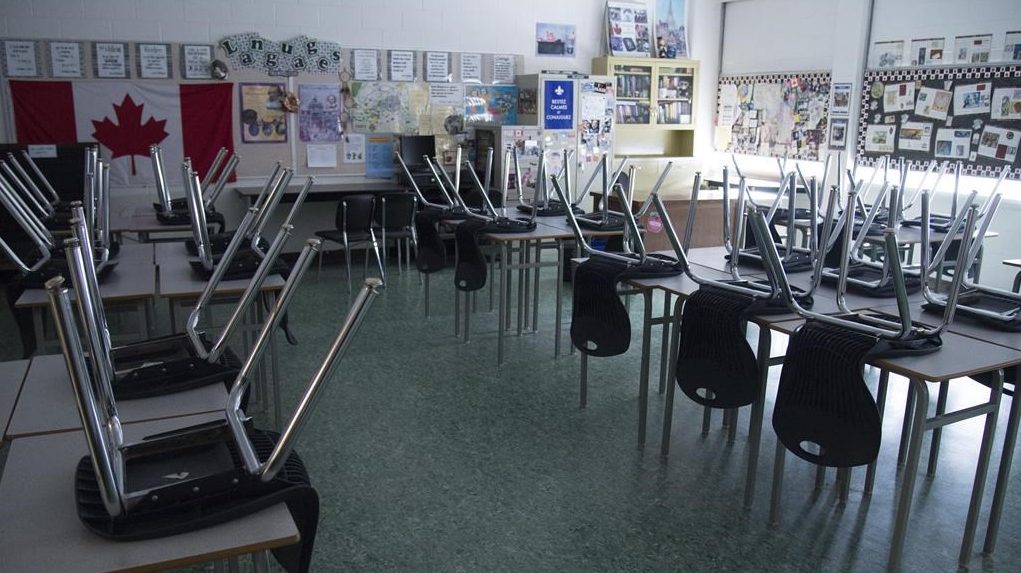
With just over three weeks left in the school year, the Ontario government has announced students will not be returning to schools for in-class learning until September.
Premier Ford said despite the COVID-19 science tables saying schools could open on a regional basis, they could not tell him it wouldn’t lead to thousands of new cases, adding their modelling showed thousands of new cases were possible if students and teachers returned to school prior to being fully vaccinated.
Ford said there was also a risk of spreading new variants.
“As your premier, these aren’t risks I’m willing to take,” he added.
The province says the decision was made in order to preserve other children’s activities this summer including day camps and sports.
The premier is encouraging schools to hold in-person outdoor graduations ceremonies at the end of the school year for students to be able to reconnect outside. Ford said these ceremonies should not be limited to just Grade 8 and Grade 12, but all grades so all students can see their classmates.
Ontario hopes to have as many youth aged 12-17 fully vaccinated by the start of the school year in September. Ford said Wednesday they would not be making the COVID-19 vaccine mandatory in order to attend school for anyone eligible, but “strongly encouraged” people get their shots.
Ford also said there is a possibility the province could enter Stage 1 of the reopening plan earlier than June 14, but is waiting on advice from the Chief Medical Officer of Health.
Ontario’s stay-at-home order has been lifted, but the Ford government said all COVID-19 restrictions will remain in place until the province enters Stage 1.
The province’s COVID-19 Science Advisory Table has said it believes schools can reopen safely on a regional basis for in-person learning for the last month of the school year.
Last week, Ford sent a letter to various stakeholders, including the advisory tables, health officials, school boards and teachers, asking for advice on whether it would be safe to reopen for in-person learning.
When Ford was asked directly why he decided to do the opposite of what the science table and the Medical Officers of Health recommended, he said they didn’t come to a consensus and didn’t answer the questions he asked.
“What they refused to answer was how many cases,” remarked Ford.
The Elementary Teachers’ Federation of Ontario (ETFO) said Ford has failed students by ignoring recommendations that would have made schools safer.
“This advice included repeated calls for smaller class sizes, improved ventilation, and adequate personal protective equipment for educators,” read a statement President Sam Hammond.
“They also, negligently, refused to acknowledge schools as primary drivers of COVID-19 transmission.”
Hammond urged Ford to create an education advisory table to ensure a safe return to schools in September.
A group of children’s health organizations, including SickKids Hospital, said it was disappointed in the government’s decision and called for planning to ensure children are prioritized during the pandemic recovery.
“For many kids, decisions by government will impact their learning, development, physical and mental health not only now but for years to come,” the Children’s Health Coalition said in a statement.
The head of the Registered Nurses’ Association of Ontario, however, said she supported the premier’s cautious approach.
“We fully understand the importance of school for children’s mental health and academic development,” Doris Grinspun wrote on Twitter. “However, the risk of a wave four is too high. We fully support (Ford’s) decision to keep schools closed until September.”
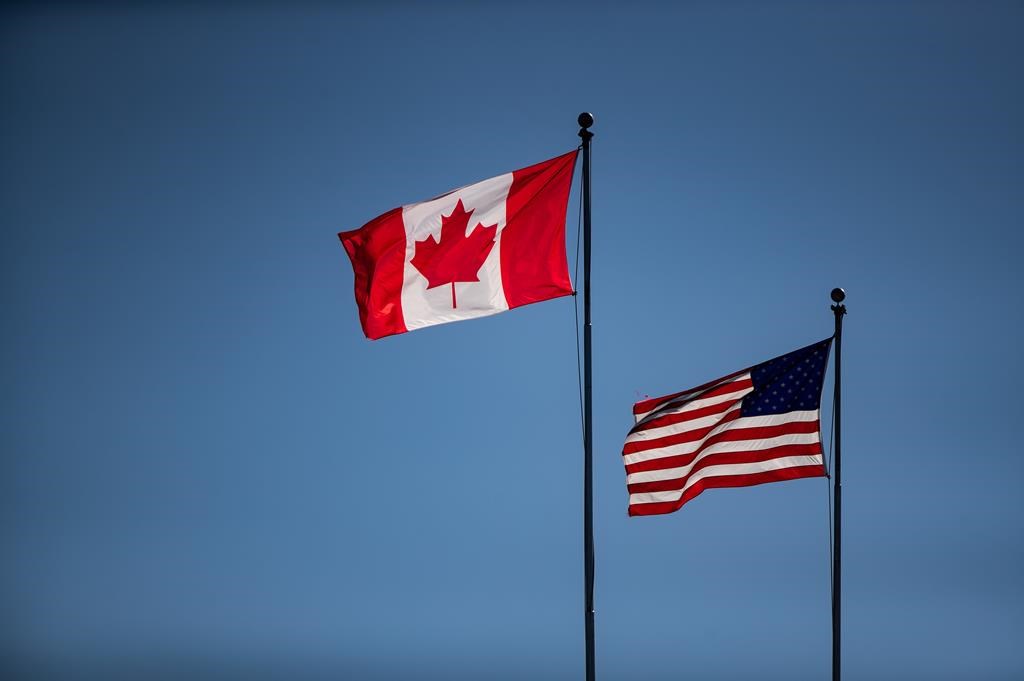
MONTREAL (NEWS 1130) – The federal government continues to feel pressure to re-open the border with the U.S., but Canada’s foreign affairs minister says our country isn’t ready.
Marc Garneau says he’s very aware Canadians are growing impatient about the ongoing shutdown of the Canada-U.S. border.
Travel across the land border remains restricted to most non-essential traffic, as has been the case for more than a year.
In a virtual conversation with the CEO of Montreal’s chamber of commerce, Garneau declined to offer a set of criteria to determine a re-opening plan.
He says he and his cabinet colleagues are discussing the matter with the provinces, but says authorities are wary of opening the flood gates to a potential fourth wave of COVID-19.
Garneau says predictability remains the watch word, while acknowledging the situation a month from now is hard to predict.
The border restrictions were first brought in in March of last year, when COVID-19 began to spread rapidly in both countries.
The closure has been extended on a monthly basis, most recently until at least June 21 of this year.
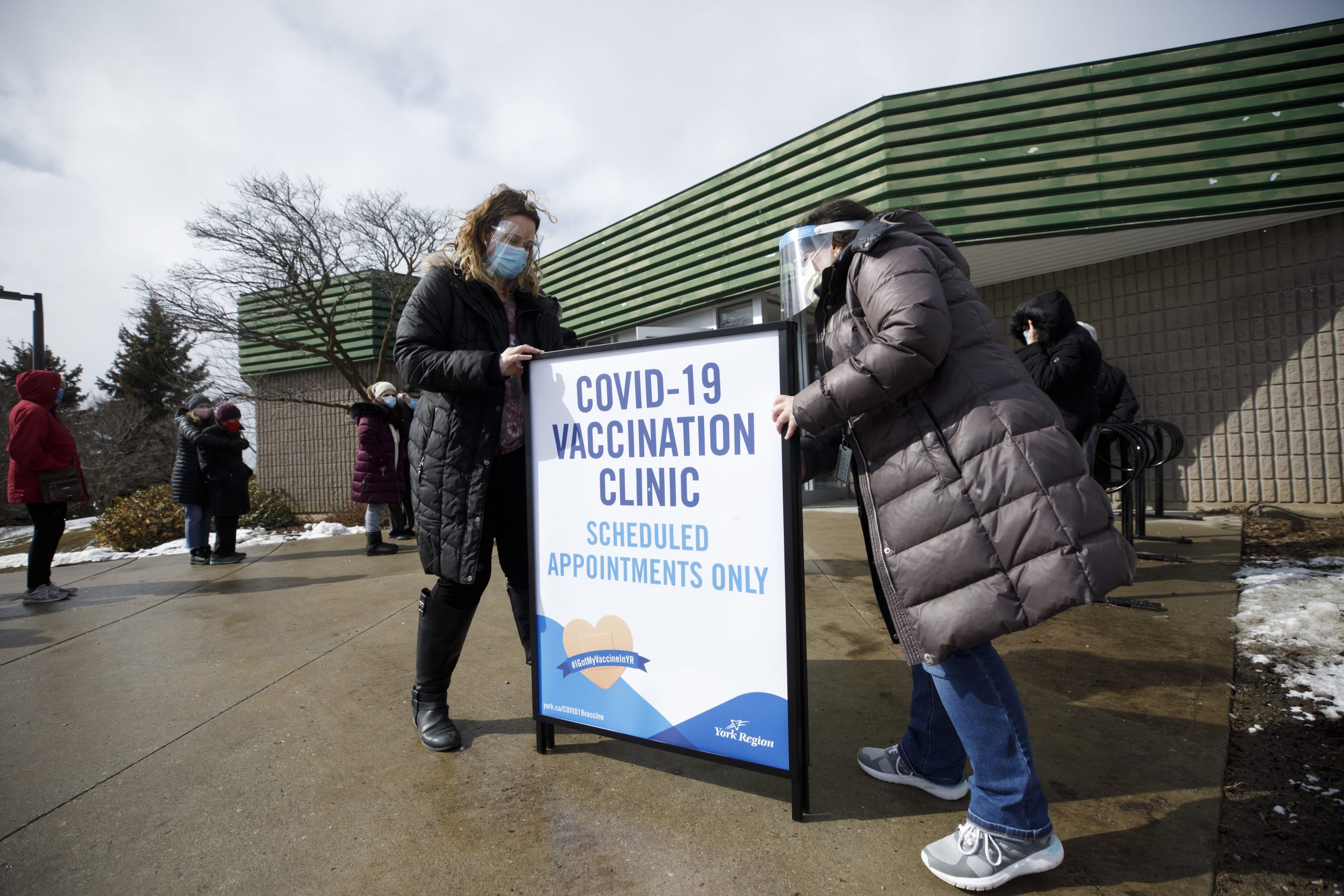
Anyone who already has an appointment can rebook. Any appointments already booked will not be cancelled unless a new and earlier appointment is confimed.
The region is just under two weeks ahead of the province’s plan to allow residents to book their shots at an earlier date.
Ontario will be allowing those 70+ to book their COVID-19 second doses as of June 14.
High risk health care workers, those with the highest risk health conditions and Indigenous individuals are also eligible for their second doses.
As of May 26, 70 per cent of adults in York have been partially vaccinated and 4.2 per cent have been fully vaccinated.
In Ontario, 66 per cent of all eligible residents have received their first COVID-19 vaccine.









